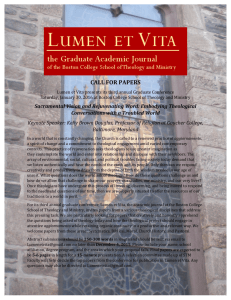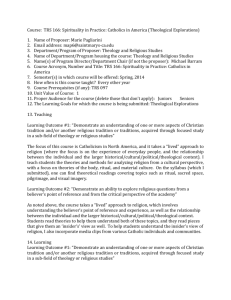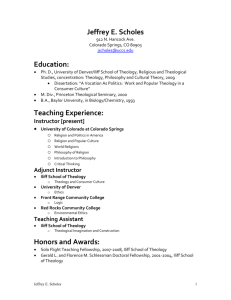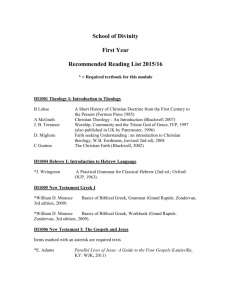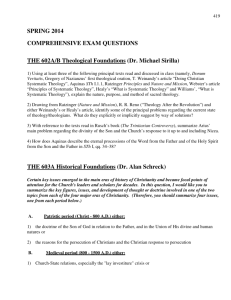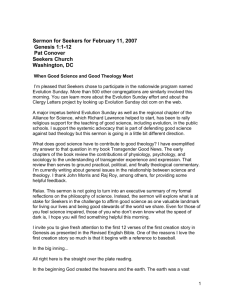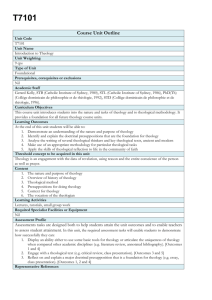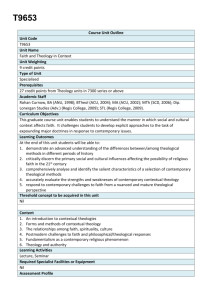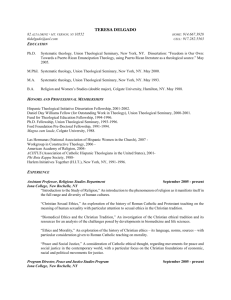Theology students - ResearchSpace@Auckland
advertisement
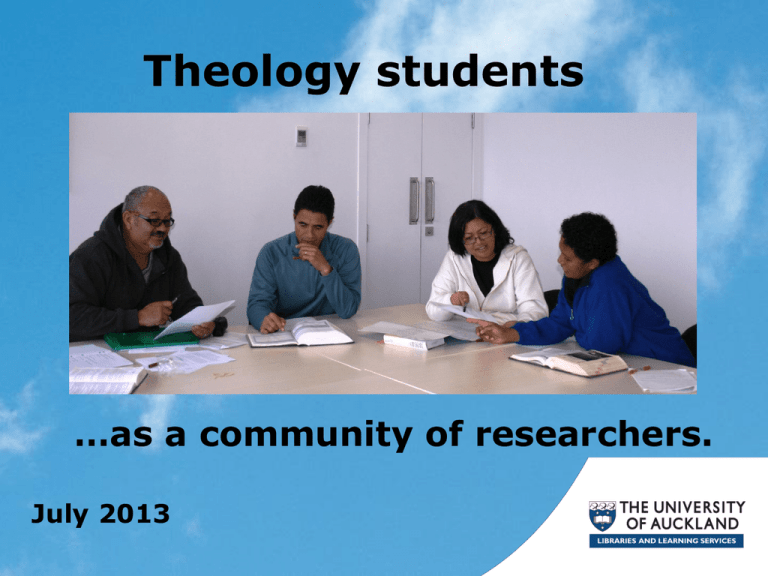
Theology students …as a community of researchers. July 2013 Why are preferred information seeking behaviour models important? For the student • • Lifelong learning Finding the information literacy that suits the student Credits: CCL image from Flickr For the Library Change the physical environment and services. Variety of spaces for different users and uses Individual study Unstructured and casual group study Structured and planned collaborations Research activities Garraway, John. "Evaluating Space in Academic Libraries - Visual Examples of the Teals Framework in Practice." In Library Update. Auckland: University of Auckland Libraries and Learning Services, 2013. “The traditional profile of students enrolled in theological colleges as young, single and male has changed significantly…. A Melbourne College of Divinity survey in 1998 revealed that only 10% of students were studying for ordained ministry and that 65% of students were married women, aged over 35.” Credits: CCL images from Flickr Brunton, Christine. "The Effects of Library User-Education Programmes on the InformationSeeking Behaviour of Brisbane College of Theology Students," Journal of Religious & Theological Information 7, no. 2 (2005): 56. ANZATS goals • Encouraging deep rather than surface learning. "How Deeply Do Our Students Learn?". Transforming Theology, no. 5 (2012): 1. • “A student centred approach puts the spotlight on the learner as active participant in the educative process.” "Who Does What in Your Classroom?". Transforming Theology, no. 3 (2011): 1. Comparing Deep and Surface Deep • Actively engaged • Trial and error • Express own ideas • Information used to develop an argument "How Deeply Do Our Students Learn?". Transforming Theology, no. 5 (2012): 1. Surface • Passive participant • Memorising • Summarising • Facts and figures • Support an existing argument • Acquire and apply techniques Diehm, Rae-Anne, and Mandy Lupton. "Approaches to Learning Information Literacy: A Phenomenographic Study." The Journal of Academic Librarianship 38, no. 4 (2012): 217-25. Connection between deep / surface and information seeking Lincoln, Timothy D. "Curricular Information Demand in Theological Degrees: Operationalizing a Key Concept for Library Services." Journal of Religious & Theological Information 12, no. 1-2 (2013): 13-28. Focus group questions • Is there a connection between deep / surface and group work? • How does a student centred environment respond to student preferences/needs? 1. How do you most prefer to work? 2. When you get an assignment what are the first things you do? 3. Being given readings or finding your own? Baeten, Marlies, Katrien Struyven, and Filip Dochy. "Student-Centred Teaching Methods: Can They Optimise Students’ Approaches to Learning in Professional Higher Education?". Studies in Educational Evaluation 39, no. 1 (2013): 14-22. Alone As a pair In a group Group work versus individual work Does doing research either alone, as a pair or in a group fundamentally change the process for the student? Contextual - appropriate for some cultures but not others? Is there something about theology that lends it to co-operative study methods? Focus group and limitations • A focus group of 12 theology students met for one hour with a little warning about the nature of the questions. • People interact with each other • Mixed group of students • Self-selection • Confident about doing research • Sometimes moved away from the questions Question 1 How do you most prefer to work? Alone With one person As a group Question 2 How I start to work on an assignment / exam: Alone With one person As a group Question 3 Guided Open opportunity “printed course reader” Alone With one person “my own assignment topics, and research using my own skills” As a group Problem Based Learning Improved student engagement Skills developed: • research skills, • negotiation and teamwork, • reading, writing, and oral communication. Allen, Deborah E., Richard S. Donham, and Stephen A. Bernhardt. "ProblemBased Learning." New Directions for Teaching and Learning 2011, no. 128 (2011): 21-29. Group learning Focus group reflections Positive Negative • Great for communication skills • The outcome you want determines if a group process is good • Useful if you all have knowledge to share • Others in the group have incorrect information • Hard for part timers. • I work alone so I can work as I please • Others take your ideas as their own Talanoa - Pacific focus Story, telling, conversation • Culturally appropriate • encourages response commons.wikimedia.org • Dissent is culturally difficult (kau’italanoa) Havea, Jione. Talanoa Ripples : Across Borders, Cultures, Disciplines. Albany: Pasifika@Massey, 2010. Talanoa – focus group reflections • I'm open to talanoa like this now because of the academic context but I don't talanoa like this in the presence of my parents. • Contextual: you don't come as equals. • Pacific Islands’ students fail exams because they don't know how to research. • It is a “cross” - it is also a beautiful thing to observe. Disciples (in Matthew) do they behave like digital natives? • Insightful? (24:3) or not (14:26) • More confident than capable (17:19) • Questioning (17:10, 18:1) • Most often treated as a group (26:35) Summary • Student preference for individual information seeking • Student preference for challenging tasks with some guidance but room for self directed research • Students welcomed deep learning • Group information seeking or Problem Based Learning needs to be prepared well and allow for individual perspectives Photo credits Many thanks to Jenny Harper, Library Assistant, John Kinder Theological Library for the photos of students working alone or in groups.

